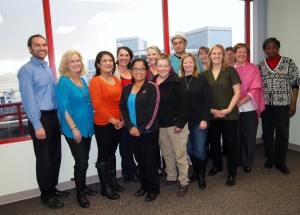 Engagement is the extent to which our staff are committed both emotionally and intellectually to excellence at VCH. Engagement is less about what we do and more about how we do it. This series celebrates the great work around safety and engagement on our front lines and is a result of the action plans prepared across VCH through the People First Safety and Engagement Survey.
Engagement is the extent to which our staff are committed both emotionally and intellectually to excellence at VCH. Engagement is less about what we do and more about how we do it. This series celebrates the great work around safety and engagement on our front lines and is a result of the action plans prepared across VCH through the People First Safety and Engagement Survey.
Home Support teams have a difficult job when they try to instill “team spirit.” It’s not that they don’t want it. It’s just that they spend the majority of their time out in the community, providing service to clients in their homes. At North Shore Home Support, for example, there are about 300 staff, regular and casuals, in three geographic teams. How do you develop People First in such a complex setting?
You begin with a representative group, says Maureen Oliver, Manager of Home Support on theNorthShore. Since last February, a group of 16 people representing workers across the home support spectrum have been meeting to discuss how to support their colleagues in the field. The group is supported by Stephen Anderson, supervisor for schedulers, Joya Gamache, Home Support Educator, and Maureen.
The People First Team reviewed their 2011 Safety & Engagement survey scores and decided to start by tackling two of the engagement questions – Q7 (At work my opinion seems to count) and Q11 (In the last 6 months, someone has talked to me about my progress). “These weren’t our lowest scores,” said Maureen, “but they were the questions that were selected by the group as places we could make some real headway.”
By asking their opinions (Q7) about what kind of assistance home support workers would find most valuable, the People First Team devised a plan to reduce stress by cutting down the amount of driving each home support worker has to do. North Shore Home Support’s catchment area has been divided into eight “People-Oriented Drives,” or PODs.
For Q11, supervisors have begun to discuss their performance and progress with each CHW team member on a regular schedule. This process takes considerable time with about 30 CHWs per supervisor.
Some People First Team members sat down recently with VCH News to talk about the importance of this work. Daisy commented that it has been great for the team to take on Q7 and validate the feelings of everyone on the team. “It’s been great to share, to connect, and to feel more a part of the system,” she noted. Stephen added that it was important to “take the feedback and communicate that you have been heard, even if what you want to see isn’t feasible at this time.”
Joya talked about the education needs, and the importance of better communication about care. “It’s so important for health care workers to share with each other what they already have learned by experience.” Joya developed a dementia workshop, “the number one issue for home care workers,” and is planning more on topics such as diabetes care and falls prevention.
Yolanda added that clients already see a difference because of the workshop. “We learned practical tips for things like bathing and getting the client out of bed, and we learned how to communicate better with a client who is being aggressive or behaving inappropriately.”
Pam felt the course made her feel safer and more confident, and she feels more valued as an employee because staff got help with this important issue.
Erwin was excited to be able to contribute to the People First conversation. “Your opinion does matter,” he said, “and it’s been good to share and to see things from another person’s eyes.”
Daisy referred to Dr Jeff Coleman’s blog, How Can We Own the People First Podium? “We may not own the podium yet, but we’re on our way.”
“I’m very proud of this group,” said manager Maureen Oliver, “for their work on behalf of the staff here at North Shore Home Support.”
If you have a story you would like to share about your team’s success, please contact me and get your story in the VCH News!
[poll id=”2″]
